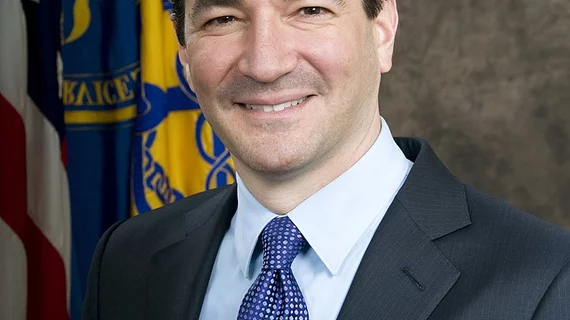FDA announces ‘historic enforcement actions’ against e-cigarette industry
The FDA is launching “the largest coordinated tobacco compliance effort” in the agency’s history, according to a 3,493-word statement from Commissioner Scott Gottlieb, MD, released on Sept. 12.
On the same day, the FDA also announced it sent more than 1,300 warning letters and fines to retailers who illegally sold JUUL and other e-cigarette products to minors during “a nationwide, undercover blitz of brick-and-mortar and online stores this summer.”
Gottlieb said e-cigarettes were initially supported by the FDA as a way to help adults transition from smoking cigarettes to a source of nicotine “that could pose a lot less harm.” But it turns out e-cigarettes have become “an epidemic” among teenagers, Gottlieb said, and no amount of nicotine should be considered safe for developing brains—particularly with its addictive qualities.
“It’s now clear to me, that in closing the on-ramp to kids, we’re going to have to narrow the off-ramp for adults who want to migrate off combustible tobacco and onto e-cigs,” Gottlieb said in the statement. “I’ve been warning the e-cigarette industry for more than a year that they needed to do much more to stem the youth trends. In my view, they treated these issues like a public relations challenge rather than seriously considering their legal obligations, the public health mandate, and the existential threat to these products.”
Flavored e-cigs, in particular, have been criticized for their appeal to youth. Gottlieb said the FDA has asked five e-cigarette manufacturers to “immediately and substantially” reverse the trend of rising e-cig use among children and teenagers, or risk the FDA rolling back recently extended compliance dates for the submission of premarket applications.
Those five companies—Vuse, Blu, JUUL, MarkTen XL and Logic—comprise more than 97 percent of the U.S. e-cig market, according to the FDA.
“We cannot allow a whole new generation to become addicted to nicotine,” Gottlieb said, noting that smoking kills nearly half a million Americans per year.
The FDA also plans to promote wider access to other nicotine replacement therapies as alternatives to help adults quit smoking. Other elements of the initiative include cracking down on flavors and product packaging designed to appeal to youth, more strictly enforcing sales in convenience and retail stores and evaluating manufacturers’ own website sales.

